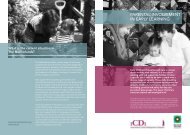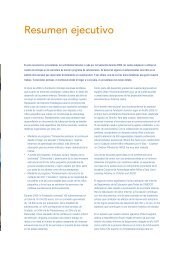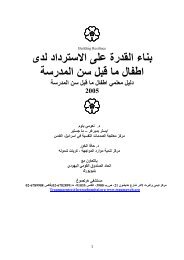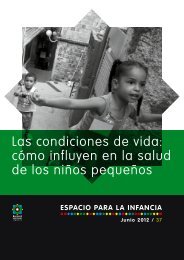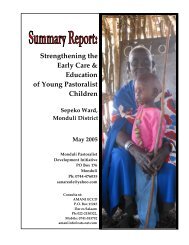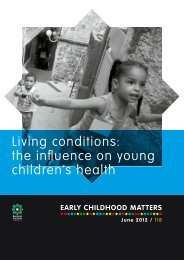Report - Bernard van Leer Foundation
Report - Bernard van Leer Foundation
Report - Bernard van Leer Foundation
Create successful ePaper yourself
Turn your PDF publications into a flip-book with our unique Google optimized e-Paper software.
Table 4: Summary of the Key ECD Related Government Sectors in TanzaniaECD Policies & Guidelines Responsibilities & Initiatives Key Challenges1. Ministry of Community Development, Gender & Children – MCDG&CCommunity DevelopmentPolicy, June 1996. (revisedpolicy yet to be released)Women and GenderDevelopment Policy, 2000.Child Development Policy,October 1996 (revised 2000)• Draft Child DevelopmentPolicy ImplementationFramework 2000,• Child defined as 0 – 18years.Co-ordinating Role through theDirectorate of Children (formed July2003), of all the sectors related tochildren’s issues through the ChildDevelopment Policy, in relation to1. the implementation of the CRC inTanzania.2. integrated issues of child survival,protection and development in thecontext of women affairs, genderissues and integrated communitydevelopment.3. Tanzania’s ‘National Programme ofAction (NPA) to Achieve the Goalsfor Tanzanian Children’ 19911. ‘No goals for children can beachieved by a single sectorworking on its own.’National Programme ForAction for Children ,19932. Strategies for co -ordinatingECD related sectors are yet tobe realized;3. Limited institutional capacityin ECD;2. Ministry of Health - MoHThe National Health Policy(1990)• Young child - conception- 5 years in context offamily health;• Reproductive and ChildHealth Section of theDirectorate of PreventiveServices.• Food & Nutrition Policy(1992)a. A number of key interventionsunder the Reproductive andChild Health Section (RCHS) ofDirectorate of PreventativeServices include:-• Safe Motherhood Initiative• Extended Programme onImmunization (EPI);• Integrated Management ofChildhood Illness (IMCI),through improved familyand community practicesfocusing on Physical andpsycho-social growth &development; Diseaseprevention; Care seeking &compliance; Homemanagement of a sick child.b. School Health Programmes –healthpromotion at school &community levelc. Tanzania Food and NutritionCentre,d. Malaria Control Programme.e. Tanzania Commission for AIDS &National AIDS ControlProgramme.1. Policy highlights that ‘Health is amulti-sectoral responsibility forpartners in education,agricultures, water and sanitation,community development etc.’ 30National Health Policy(1990)2. Available services are still limited;3. Quality of services are generallypoor;4. Cost-sharing excludesdisad<strong>van</strong>taged and mostvulnerable5. Children & women’s poorsurvival rates and health statusare directly linked to the lack ofbasic amenities, in particular cleanwater and adequate sanitation,fuel and a safe, clean, place to live.6. ‘… it is not enough just to decreethat all children should be sent toschool at the age of seven, unlessthere is a concerted campaign toimprove the nutritional status ofchildren from an early age’.(UNICEF, 1999, Children in Needof Special Protection Measures)12




